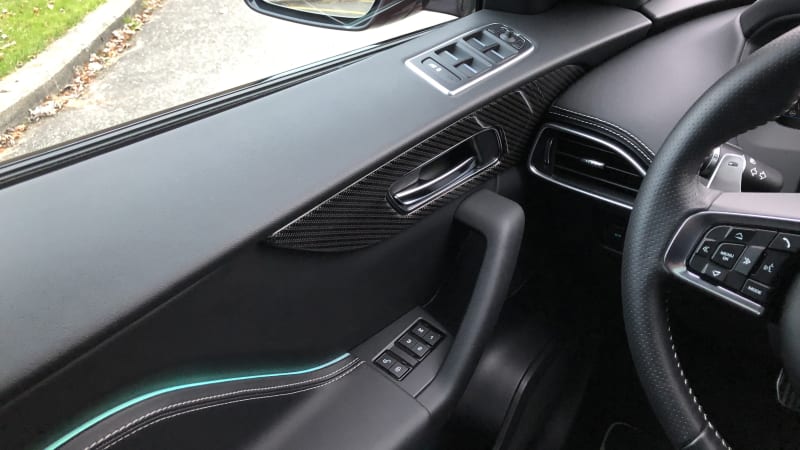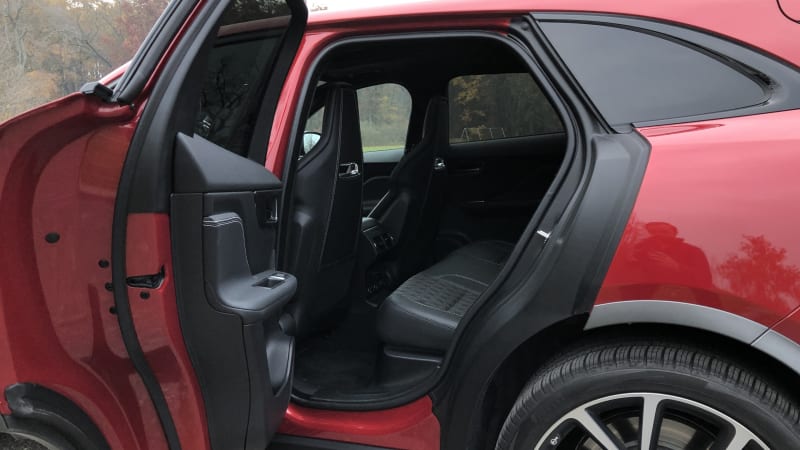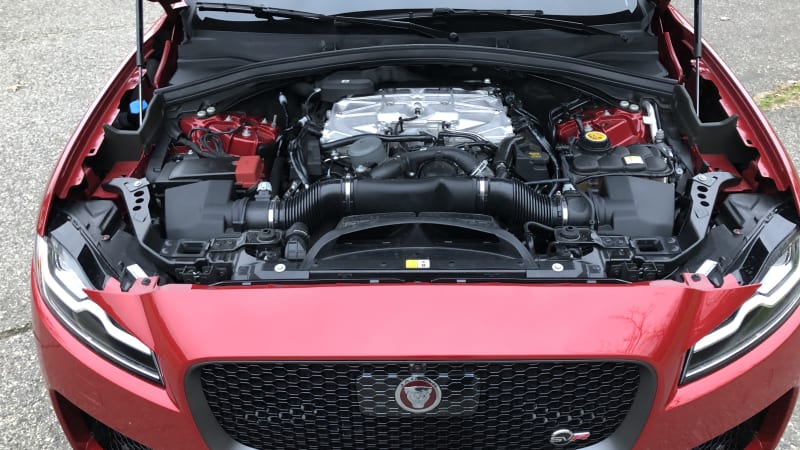2019 Jaguar F-Pace SVR Second Drive Review | A thunderingly good performance cat
https://ift.tt/2EDCgwB
Jaguar entered the high-performance SUV game late with the F-Pace SVR, but hopping on the unstoppable freight train now is better than ignoring it completely. Just like its European competition, the Jaguar has a delightfully overpowered engine and luxury in spades, as well as handling that borders on the uncanny.
But if there’s a downside to the F-Pace SVR, it’s that it falls victim to the same issue that plagues its competition: not enough differentiation. From a size, shape, power and features perspective, the SVR doesn’t stand out next to others like the Mercedes-AMG GLC 63, BMW X3 M, Porsche Macan Turbo or Alfa Romeo Stelvio Quadrifoglio. But, there is a but: One factor makes the 2020 Jaguar F-Pace SVR unique among the competition.
Jaguar gave the F-Pace SVR 550 horsepower and 502 pound-feet of torque – great numbers, but it’s how the SVR makes them that’s the kicker. Instead of a smaller, twin-turbocharged engine, Jaguar tapped its 5.0-liter supercharged V8 for duty. This makes it doubly unique: the largest displacement in its class, as well as the only one to feature a supercharger, making the driving experience palpably different than the rest. With a blower and all that displacement, there’s no lag. Power hits early and with authority, throwing us back in the nicely sculpted leather buckets. The SVR’s mid-range is especially impressive, and there’s no drop-off in power as the engine approaches redline.
Turbocharging technology is virtually lag-free in most applications these days, but the SVR’s engine is still sharper and responds quicker than the rest. The others may be as quick or quicker than the Jaguar in a straight line (the SVR hits 60 mph in 4.1 seconds), but none are able to match it in throttle response or engine character.
And then there’s the sound, that glorious exhaust cackle that’s a near carbon-copy of the F-Type SVR. Our future may be electric, but the pipes on this crossover are welcome in this world for as long as they care to stay. Their cacophony of growling and crackling is louder and meaner than any other high-performance SUV on sale today. Some hooligan who thinks just like us must’ve engineered it. The only thing missing among the loud noises is that of a supercharger whine. Not even a hint of it is audible from inside the cabin, and the supercharger is the biggest performance factor that sets this car apart. Let us hear the whine, Jaguar.




Another point of differentiation between the Jag and its contemporaries is in the styling. Ian Callum penned a beautiful crossover, and that’s no easy task. It’s attractive as a cohesive whole, not merely acceptably styled for a crossover. The competition is a mess of overwrought excess, creases, gaping grilles – they’re trying far too hard to look zesty. If being noticed is all you care about, it fits the bill. If elegance is more your speed, the Jaguar is the easy choice.
This being an SVR, there’s a certain level of handling excellence expected. And yes, it’s good, but it could be much better. Jaguar handicapped the SVR in America with all-season rubber that has no interest in being pushed to the limits of the chassis. European buyers are able to select Pirelli P-Zero summer rubber, but you’ll need to visit Tire Rack yourself to get the proper handling setup on American SVRs. The stiffer springs, re-tuned Bilstein dampers, brake-based torque vectoring system and rear-biased all-wheel drive all contribute to a sharper F-Pace, but the tires make the chassis improvements fall flat. Others like the Stelvio Quadrifoglio and Macan Turbo would easily outclass the Jag in the corners. Our drive of the F-Pace in Europe with the proper rubber proved that the F-Pace is plenty competent with summers. Just buy them if you’re someone who is concerned about getting the most out of their crossover. We imagine many won’t care, but we also firmly believe any SVR-badged vehicle should be equipped with the best tire available as standard.
The F-Pace’s interior technology is where things take a turn toward mediocrity. Few things are truly bad in a $90,000 luxury crossover, but there are noticeable shortcomings compared to others in the segment. Jaguar needs to update the infotainment system as soon as possible. The lag between an input and a response is simply unacceptable for a car made in 2019. A simple thing like turning the heated seats on is an arduous task of using both physical buttons and the touchscreen. It shouldn’t be. Thankfully, Apple CarPlay and Android Auto are both available, allowing us to leave the Jaguar software far behind for music and navigation.
Then there’s the interior design. Comparisons to the gorgeous Mercedes or modern BMW interiors are inevitable. The Jaguar interior just falls on its face next to all but the Stelvio. There’s no getting around it — Jaguar’s beautiful exterior did not carry over to the inside. Mercedes interiors feature attractive and curvaceous trim, and every button you press has a gratifying click and response. That isn’t the case for the F-Pace, which lacks a fundamental cohesiveness to its design. Consider the strange seat temperature controls, impossible-to-reach window switches and cheap black plastic buttons everywhere. Multi-colored leather seat and upholstery options can keep some of the interior excitement alive, but our tester’s all black monotone appearance does nothing to advance the luxury narrative.




At its core, the F-Pace SVR is like a budding new relationship. Falling for it is easy at the start. It’s different than the others in a way that will make your heart race, and you’ll think, this is the one. A supercharged V8 and unearthly exhaust note can do that sort of thing. Add in those devilishly good looks, and all of a sudden, you’re making up excuses to spend time with it — milk runs when there’s already a full gallon in the fridge, or a random drive to the water to go watch the sunset. Being behind the wheel is an intoxicating experience.
As time wears on, the cracks begin to show. You start commuting with it, and the achingly slow infotainment and lackluster interior become ever more obvious. Is the excitement worth the attendant compromises? Maybe a fling with one of the well-rounded and short-on-downsides Mercedes or BMW models might be interesting. Or maybe time will make the heart grow fonder for the F-Pace SVR. But that’s a tough bet to make at $89,900, which is what our tester would set you back.
The SVR’s base price of $81,015 is slightly more reasonable, but you’re going to want some of the extras like the $3,600 Driver Assist package and $450 Meridian audio system. Most of the others are right in the Jaguar’s ballpark when it comes to pricing. The 2020 GLC 63 starts at $74,745. A 2020 BMW X3 M Competition starts at $77,895. The 2019 Alfa Romeo Stelvio Quadrifoglio comes in at $81,840, and a 2019 Porsche Macan Turbo costs $84,950. This places the F-Pace SVR smack dab in the middle of the pricing discussion, right where it belongs. Jaguar didn’t overprice this car, but nor is it the budget buy.
A sports car is generally forgiven for being impractical or technologically deficient at times in its pursuit of maximum performance and driving enjoyment. Luxury performance crossovers still need to cross over: They need to be practical, but they also have to deliver luxury at a level that’s at least on-par with the competition. That’s where the F-Pace SVR comes up short. Buy it for the glorious supercharged engine and captivating looks. Try elsewhere if maximum luxury, a sophisticated interior, and user-friendly tech is the priority.
Auto Blog
via Autoblog https://ift.tt/1afPJWx
December 17, 2019 at 11:32AM
